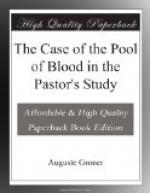Also, Janci did not know that this little village of his home had once been a flourishing city, and that an invasion of the Turks had razed it to the ground leaving, as by a miracle, only the church to tell of former glories.
The sun rose higher and higher. And now the village awoke to its daily life. Voices of cattle and noises of poultry were heard about the houses, and men and women began their accustomed round of tasks. Janci found that he had gathered enough willow twigs by this time. He tied them in a loose bundle and started on his homeward way.
His path led through wide-stretching fields and vineyards past a little hill, some distance from the village, on which stood a large house. It was not a pleasant house to look at, not a house one would care to live in, even if one did not know its use, for it looked bare and repellant, covered with its ugly yellow paint, and with all the windows secured with heavy iron bars. The trees that surrounded it were tall and thick-foliaged, casting an added gloom over the forbidding appearance of the house. At the foot of the hill was a high iron fence, cutting off what lay behind it from all the rest of the world. For this ugly yellow house enclosed in its walls a goodly sum of hopeless human misery and misfortune. It was an insane asylum.
For twenty years now, the asylum had stood on its hill, a source of superstitious terror to the villagers, but at the same time a source of added income. It meant money for them, for it afforded a constant and ever-open market for their farm products and the output of their home industry. But every now and then a scream or a harsh laugh would ring out from behind those barred windows, and those in the village who could hear, would shiver and cross themselves. Shepherd Janci had little fear of the big house. His little hut cowered close by the high iron gates, and he had a personal acquaintance with most of the patients, with all of the attendants, and most of all, with the kind elderly physician who was the head of the establishment. Janci knew them all, and had a kind word equally for all. But otherwise he was a silent man, living much within himself.
When the shepherd reached his little home, his wife came to meet him with a call to breakfast. As they sat down at the table a shadow moved past the little window. Janci looked up. “Who was that?” asked Margit, looking up from her folded hands. She had just finished her murmured prayer.
“Pastor’s Liska,” replied Janci indifferently, beginning his meal. (Liska was the local abbreviation for Elizabeth.)’
“In such a hurry?” thought the shepherd’s wife. Her curiosity would not let her rest. “I hope His Reverence isn’t ill again,” she remarked after a while. Janci did not hear her, for he was very busy picking a fly out of his milk cup.
“Do you think Liska was going for the old man?” began Margit again after a few minutes.




